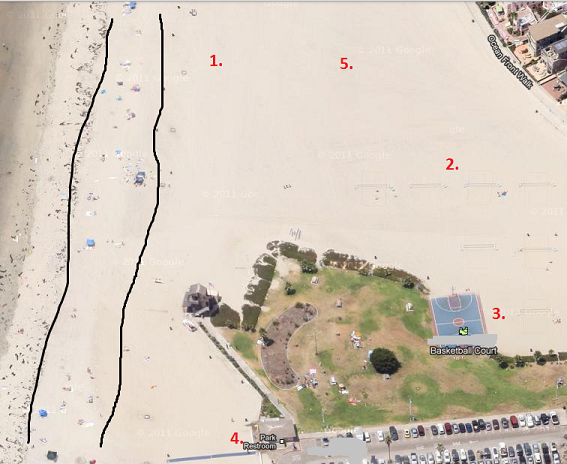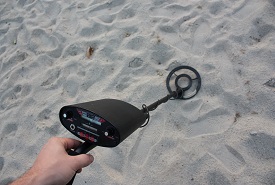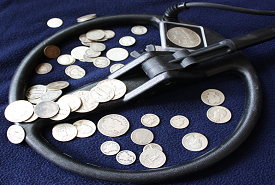Metal Detecting Tips for Beginners:
If you are thinking about taking up the metal detecting hobby yourself, now is the perfect time and hopefully by reading through this website you will find all the information you need. Below is what I consider basic knowledge that every metal detectorist should know. From learning how to metal detect, understanding the known laws, and finding the best places to metal detect, the information below should give you a good overview.
Metal Detecting Tips: Learn How to Metal Detect
Metal detecting is pretty straight forward and I am a firm believer in practice makes perfect. There are so many places to try it out but the key to metal detecting is knowing the location and knowing your detector. While this sounds obvious it is extremely important because with even a beginner metal detector, understanding the proper settings, technology, and capabilities of your detector are paramount. If you own any of the metal detectors that I have highlighted on this website, you will find instructional videos and information regarding each detector. So how else can you learn how to metal detect? Read the manual, browse forums, check out YouTube, and most importantly, get out there and try it yourself! You can only get so much information from reading, you have to get out there and get comfortable with your detector. The video here is a great tutorial on metal detecting as this famous metal detectorist known as “ChicagoRon” gives a great metal detecting tips for beginners as well as an overview of the metal detecting hobby.
Metal Detecting Tips: Choosing your First Metal Detector
My first metal detector was a Bounty Hunter Tracker IV that I got for Christmas. I glanced through the manual and off I went to the nearest park for some treasure hunting. I was frustrated in the beginning but with metal detecting, perseverance is important. It took me months to figure out all the settings and I did lots of research on all the best locations to metal detect. I have compiled that information in this website so hopefully you have a good foundation for treasure hunting. Finally I settled on beach metal detecting and never looked back. Finding the type of metal detecting you enjoy, whether it be beach hunting, searching for relics, or looking for gold in its pure form, it is something that you will figure out once you have had your beginner machine for awhile. If you are interested in doing further research on your first metal detector have a look at this page detailing the best beginner metal detectors.
Metal Detecting Tips: Learn How to Properly Swing Your Metal Detector
The way you swing your metal detector is just as important as choosing the right settings. The popular metal detecting saying “low and slow” is about keeping the metal detector coil as as close to the ground without touching it and you want to swing the metal detector slow enough to allow it to process what is beneath it. For example, if you swing to fast, the metal detector will not pick up smaller targets because it did not have enough time to pick up the disturbance in the ground, thus no target will be heard. Additionally, if you swing your detector coil to far off the ground that is depth you are losing if it were closer.
Metal Detecting Tips: Learn How to Dig
This might sound vague but this is an important metal detecting tip because digging up a target without leaving any trace of you disturbing the ground is crucial, especially if you want to return to that spot! I have seen beginner detectorists with shovels at the beach and even at the park, don’t be that guy! Use the right digging tools for the job and cover your holes appropriately. Check out this video, it shows you how to properly dig what is known as a “plug”. Digging a plug involves cutting only a portion of the grass so as not to totally destroy the roots beneath and then firmly applying the loose grass back into the dug hole. This helps return the area to it’s natural state much quicker than leaving a big crater. Personally, I use a scoop on the beaches and a Lesche digger and pro-pointer when relic hunting. Using the right tools for the job is essential if you want to improve your efficiency when digging. The longer it takes to acquire targets the less area your will be able to swing your coil over.
Metal Detecting Tips: Bring the Right Equipment
Similar to learning how to dig, bringing the right equipment is everything. Your gear should help you stay out longer, dig better, and allow you to enjoy yourself when treasure hunting. For example, I have forgot my beach scoop on more than one occasion when I hastily grab my gear for a beach hunt. I usually keep a small shovel in my car so that is what I had with me at the beach. It was terrible, my ability to get targets went from seconds to minutes! Metal detecting in an of itself is not particularly physical, it’s the digging that can be rough on the body. Repeatedly bending over can be rough on the knees and back. These pants, knee pads, and gloves are great for metal detecting. Also, if you really want to speed up the dig time, grab a Pin pointer.
Metal Detecting Tips: Know Local Metal Detecting Laws and Regulations
I will start by saying I am not a lawyer but I think I have a decent grasp on the laws governing metal detecting. Now it is mostly going to depend on your location but in general private property is going to require permission, written permission being best. This is because if you are metal detecting on private property without permission it is considered trespassing. If you have any family members or friends with property, kindly ask if you can metal detect there. Also, state and national parks are off limits and usually the rangers will write you a ticket with a fine and confiscate your metal detector. Public property is hit or miss and there is a lot of grey area. Parks, beaches, schools, churches are going to be dependent on local laws and the people who work there. I have been asked to leave a local park and I agreed, this was by a maintenance crew, not the police. Could I have argued with the guy regarding his authority, sure, but it is worth it? No. There are plenty of places out there.
Metal Detecting Tips: Do Research on Possible Locations
Location, location, location. The best places to metal detect are all about finding that spot that no one else has detected or one that is continually replenished. Yes you can get lucky and find targets with little research but it can pay off big if you look into the history of the area. Here are some great starting locations:
High activity areas are going to be providing a continious supply of metal detecting finds. These areas includes, parks, schools, fairgrounds, sport fields, etc. It is important to think where items can be lost. With my first metal detector I hunted a nearby park, concentrating on where people relaxed for a picnic, the baseball outfield, and the bleachers (dirt underneath) where spectactors watched. You will be surprised by the amount of coins lost when people are moving around, not to mention possible jewelry and other items. It is a good idea to have a couple places in mind and rotate so you give the locations time to replenish the goodies.
Old ground is where you look for relics and silver coins but do your research and look for existing sites. History is the key. Is the local park by your house old? Do you, your family members, or anyone you know have old property? If so, these can be great hunting locations (should be easy to get permission). If not, you can perform the research yourself with Google by looking for old maps, there are plenty of images online. Please be aware of local laws and be respectful of private property but if you decide to look in the woods search for anything out of place such as depressed ground. That ground could have been a cellar, a well, or the foundation of an old homestead, also look for areas near a water source. This might be a stinky proposition but old outhouses can be a great hunting spot as well. Be aware of what you are finding, are the nails or construction debris new or old? Use your detector to help verify the age of the location. If you would like to learn about relic hunting and other possible locations, click here. Check out this video, I LOVE it because it tells you so many great relic hunting locations and possibilities!
 The beach can be a treasure trove of great items. From old coins to jewelry, the beach will regularly give up the goodies. That is because it is continually refreshed by visitors and mother nature. But, there is a caveat, it is also regularly hunted. You have to think outside the box when hunting popular beaches. Try to go after the crowds or when the weather is in your favor such as after a large storm or there is a low tide. Start with the dry sand where people place there items, often called the “towel line”. Other good spots are volleyball courts, entrances/exits to the beach, and fire pits (discriminate out the iron nails). If you want to know more, check out the best beach metal detecting tips here!
The beach can be a treasure trove of great items. From old coins to jewelry, the beach will regularly give up the goodies. That is because it is continually refreshed by visitors and mother nature. But, there is a caveat, it is also regularly hunted. You have to think outside the box when hunting popular beaches. Try to go after the crowds or when the weather is in your favor such as after a large storm or there is a low tide. Start with the dry sand where people place there items, often called the “towel line”. Other good spots are volleyball courts, entrances/exits to the beach, and fire pits (discriminate out the iron nails). If you want to know more, check out the best beach metal detecting tips here!
Metal Detecting Tips: Have Reasonable Expectations
You are going to find targets, lots of them. Don’t expect that every target will be long lost treasure. Patience and positive thinking are important if you want this to be a rewarding hobby. Personally, I like to get pumped up before metal detecting hunts by looking at my old finds or going on YouTube and seeing what others have found. I made a webpage for some of the best metal detecting finds on YouTube, if it doesn’t get you in the mood for treasure hunting I don’t know what will. Another thing I like to do is envision the old site, the history of what may have happened. Every time I find something and I don’t know what it is, I run to my computer and Google it to see what I have. Having a positive attitude will help you appreciate every new find! Don’t view metal detecting as a chore. Appreciate being outside. I love beach metal detecting and waking up at 5 a.m. can be rough but looking at the morning sunrise is one of the joys of treasure hunting.
You will dig trash, lots of it. It’s an unfortunate part of metal detecting. Why not clean up the environment at the same time is the way I view it. I carry a finds pouch for just that reason. One section is for trash and the other for coins, etc. It’s unbelievable the amount of trash people leave at the beautiful beaches in Southern California. I used to discriminate out trash. Little did I know I was discriminating out good targets! I can’t tell you how many gold rings have sounded iffy. Remember a gold ring reads as a pull tab on most detectors.
Metal Detecting Tips: Rescan Every Hole
You would be surprised how many targets share the same location. I routinely find “coin spills” on the beach consisting of many coins. Also, tidal action can produce “pockets” which are concentrations of items, sometimes one on top of the other. Some detectorists will even search existing holes of others, often finding targets that were left behind.
Metal Detecting Tips: Have a Testing Location
Grab some different coins and possibly some jewelry and bring it to a spot where you can test out your metal detector by burying the items at various depths. Check out this video describing what is often called a “test garden”. I prefer the local park’s playground sand but you can just as well build one yourself. I regularly go to a local volleyball court at a park right by my house to test out various targets. Be careful with jewelry if you decide to bring any for testing, something to do is tie a piece of floss or fishing line to the jewelry so you know where it is when you bury it for testing. Play with the controls, paying attention to ground balance, discrimination, and sensitivity. Each of these plays a huge role in what your metal detector will find beneath the ground.
Metal Detecting Tips: Taking Care of Your Metal Detector
My Minelab Excalibur II is like a part of the family! I use lubricants to keep the wires nice, I use a brush to get sand out of the joints, and I always clean it with fresh water after a long hunt, it goes in the shower with me sometimes! Embarrassing I know, but I care about maintenance of such an expensive machine. You should too! Your detector will function flawlessly and last longer if you treat it with care.
Metal Detecting Tips: Metal Detecting Safety
I wanted to end with an important topic. Being outdoors has it’s dangers and metal detecting is no exception. Critters, poison oak, and unsavory people can be a problem (mostly just at night). Just exercise caution if you are alone in the woods or on the beaches at night. I always carry a backpack with water, snacks, and personal protection. The type of personal protection you should carry varies wildly by location, for instance at the beaches my large stainless steel beach scoop is intimidating enough. If you are just starting out, go with a buddy or stick with the familiar locations until you are comfortable. Go out in the day, the morning is always a great time. Also, in the evening before sunset. I have never had a problem with people, they are usually just curious but you may get some questions regarding your detector or your finds. Never show your finds at the location where you found them! If a person claims they lost that, what do you do? Now if someone comes to you saying they lost something, ask them what it looks like and where they lost it BEFORE you show anything. I am all about returning lost items but I don’t want to be tricked. I get asked regularly “find anything good?” to which I reply “nope just trash and some loose change”. As for your detector if someone asks “how much was that thing?” I reply “this old thing, about $100 bucks.” You don’t want to garner to much attention. Don’t get me wrong, I am always friendly and willing to tell stories but use your judgment.



